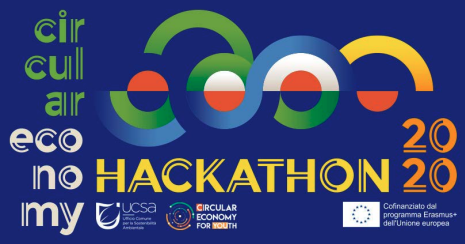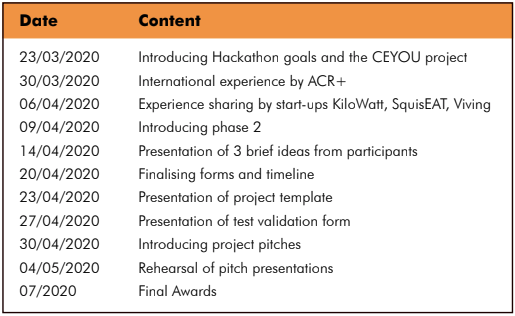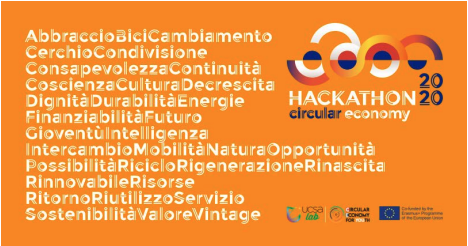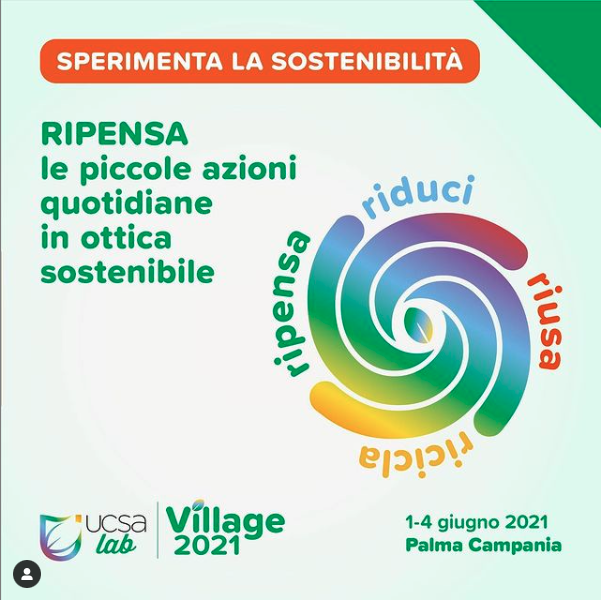CEYOU project partner UCSA in Southern Italy decided to organise a hackathon to call on young people to develop ideas for circular economy services to be later on tested in the four municipalities of UCSA (Palma Campania, San Gennaro Vesuviano, San Giuseppe Vesuviano and Striano).
The target group were young people aged between 18 and 30 living in the UCSA municipalities. The hackathon was originally planned as a 2 full days event, but due to the coronavirus emergency and lockdown the hackathon format was transformed into a series of online events from March until May 2020.
To adapt to the participants’ needs and the remote format, the event was divided into several small plenary events, leaving each team free to meet for developing their ideas.

The plenary events had different purposes:
• Introduction to circular economy principles and best practices;
• co-designing tools based on service design methodologies;
• hypothesis validation by experts;
• projects pitches definition.
Participants were challenged to come up with innovative circular economy solutions on three specific topics:
• Reduction of food waste;
• Waste prevention;
• Extending the lifespan of goods.
A final evaluation session was organised with an external jury made of circular economy experts who evaluated the projects and awarded 3 projects as the best proposals.
The awarded projects were:
- RustiCO2 – savory products not sold put up for sale and sustainable delivery system;
- Seconda Stagione – short chain between agricultural producers and consumers and sustainable delivery system;
- CUPS – coworking spaces and library of things.

Communication tools
Results and follow-up
A private Facebook group was created to share the works and to give the opportunity to
participants to interact and to get inspired by the benchmarking. Participants were constantly
informed of the “What’s next” through official mails with all the indications of the steps to take
and they also had direct contact with Whatsapp broadcast list that also gave them the right
support and encouragement messages. Instagram and Twitter were used as dissemination
tools.
UCSA managed to involve in the hackathon 23 young participants from 3 UCSA municipalities, 6 local associations, 3 city councilors, 3 local experts, 3 municipal officers and 2 start-ups who shared their experience to inspire participants. Therefore, all the relevant actors were reached. The young people actively participated throughout the different phases of the hackathon.
The hackathon’s main output is a set of 5 different circular services ideas that shall be tested in the UCSA context. As a follow-up to this, UCSA is working on involving youth organizations (also those who did not take part in the hackathon) in directly testing and implementing circular services as well as organising training and networking events to engage and empower a wider number of stakeholders. 8 local associations, 4 communities and 7 experts were identified as relevant contacts for a follow-up and dissemination of the CEYOU project.
The first objective will be a training course based on co-designing, lean start-up and business modelling methodologies. In addition, a programme of public networking and training events will be held during the project to transfer specific know-how on sustainability, circular economy and social and sustainable entrepreneurship. All these activities are being developed in the framework of a permanent forum involving youth formal and informal communities and organisations called “UCSA-LAB”.
Areas of work identified
Three main areas were identified as key areas for further work:
- awareness raising on sustainability and circularity among citizens, towards youth
associations and communities we directly involved in the activities; - co-designing and co-managing new circular services together with youth organizations
with a public-private partnership approach; - involving youth organizations in the definition of new sustainability policies and initiatives
in the context of a “UCSA-LAB” a permanent forum.

The hackathon was a successful experience to proof that youths are sensible and motivated to move forward starting from their local context towards circular economy.
Participants appreciated the change on a digital modality of the event during the lockdown caused by Covid19. “It has been seen like a window of hope on that difficult times” reporting to the letter what was received by the participants.
They were stimulated by ideas exchange between different associations, the support received by tutors during the activities and the way the hackathon was organized and managed made them feel constantly part of a journey always connected each other, no matter the distance.
Subsequently, the projects conceived during the Hackathon were reviewed with the help of an expert. During this period of “re-generation of ideas” the participants identified possible criticalities and redefined their project ideas in search of innovative solutions.
All this took place in a period of strict restrictions due to Covid, in which, despite the commitment and involvement in such projects, young people, felt the absence of aggregative moments aimed at increasing the sense of community. For this reason, when the restrictions were reduced, the same young people were involved in the project “EcoCiak”, an outdoor and itinerant film festival in the four municipalities of UCSA, where movies related to the Sustainable Development Goals of the 2030 Agenda (SDGs) were screened.
The event, held in compliance with anti-Covid regulations, allowed to open dialogue and raise awareness about environmental and sustainable issues, increasing, in addition, the desire to create projects capable of generating change in the local context.
In order to connect the participants with other organisations active in the field of circular economy, a series of meetings were planned in November 2020, but they had to be cancelled due to the worsening of the health situation.
For this reason, a new format was designed, the “UCSALab Circular Talk”, which allowed the comparison with realities already working in circular economy initiatives. The young people of UCSALab interviewed guests live on Facebook, thus achieving a twofold objective:
to give visibility to virtuous circular economy projects, demonstrating that it is possible to take new paths by changing perspective; and to increase their knowledge of circular markets and regeneration thanks to the valuable advice they received.
All these activities led to the planning of a Sustainability Village. An event in which, through seminars, workshops and activities, to test the validity of the services created with the Hackathon and, at the same time, to bring the community of the territories involved closer to daily practices of circular economy.
You can see more pictures of the Sustainability Village and other work with UCSALab on our Instagram

